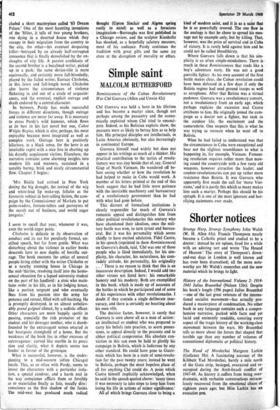Reminiscences of the Cuban Revolutionary War Che Guevara (Allen and
Unwin 42s)
Simple saint
MALCOLM RUTHERFORD
Che Guevara was held a hero in his lifetime and has become a martyr since, though not perhaps among the peasantry and the econo- mically exploited whom Che tried to emanci- pate. Indeed, as his Bolivian exploits show, the peasants were as likely to betray him as to help him. His principal disciples are intellectuals, in Latin America obviously, but also increasingly in continental Europe.
Guevara himself read widely but does not appear in his writings as much of a thinker. His practical contribution to the tactics of revolu- tionary war was tiny beside that of, say, General Chap of North Vietnam. He wandered off be- fore seeing whether or how the revolution he had helped to make in Cuba would work. A number of his letters printed at the end of this book suggest that he had little more patience with the inevitable machinery and bureaucracy of a revolutionary government than he had with what had gone before.
This distrust of formalised institutions is clearly responsible for much of Guevara's romantic appeal and distinguishes him from other political revolutionaries this century who have abandoned their idealism, once the mili- tary battle was won, to turn tyrant and bureau- crat. But it was his personality which seems chiefly to have excited adulation. Fidel Castro, in his speech (reprinted in these Reminiscences) on Guevara's death, said, 'CM was one of those people who is liked immediately, for his sim- plicity, his character, his naturalness, his com- radely attitude, his personality, his originality . . .' There is no reason to think that this is an inaccurate description. Indeed, I would add two other virtues not listed here: his remarkable honesty and his modesty. Both are exemplified in this book, which is made up of accounts of the battles in which he participated and of some of his experiences with other revolutionaries. I doubt if they contain a single deliberate Mac- curacy, and there is certainly no boasting about his own role.
The decisive factor, however, is surely that Guevara is seen above all as a man of action: an intellectual or student who was prepared to carry his beliefs into practice, to scorn posses- sions, to appeal directly to the peasants and to abhor political compromise. His absolute con- viction in this can even be held to glorify his campaign in Bolivia, which is ludicrous by any other standard. He could have gone to Guate- mala which has been in a state of semi-revolu- tion for the past twenty years; instead he went to Bolivia, perhaps the most hopeless place of all for anything Che could do. A point which Castro himself implicitly acknowledged, when he said in the speech quoted above: 'many times it was necessary to take steps to keep him from losing his life in actions of minor significance.'
All of which brings Guevara close to being a kind of' modern saint, and it is as a saint that he is so powerfully revered. The one flaw in the analogy is that he chose to spread his mes- sage not by example only, but by killing. That, however, was the price of survival and in Cuba of victory. It is rarely held against him and he could not be called bloodthirsty.
Where Guevara falls down is that his sim- plicity is so often simple-mindedness. There is much in these Reminiscences that reads like a boy's adventure story. He was not a good. guerrilla fighter. As his own account of the first battle makes clear, the Cuban revolution could have been defeated in a few days if only the Batista regime had used ground troops as well as aeroplanes. After that Batista was a virtual_ pushover. Guevara was a revolutionary convert, not a revolutionary from an early age, which perhaps explains the excessive zeal Castro attributes to him. He originally joined the cam- paign as a doctor not a fighter, but took to the outdoor life, the excitement and the camaraderie. One suspects that this is what he was trying to recreate when he went off to Bolivia.
What he had failed to understand was that the circumstances in Cuba were exceptional and bear not the slightest resemblance to what is happening in, for example, Vietnam. Foment- ing revolution requires rather more than mov- ing round the countryside with a few rusty old weapons, however attractive the leader; and counter-revolutionaries can put up rather more resistance than Batista. It was Guevara who apparently first made the call for 'more Viet- nams,' and it is partly this which to many makes him such a martyr. Perhaps this should be his epitaph. It is one of the most ignorant and hor- rifying statements ever made.






































 Previous page
Previous page